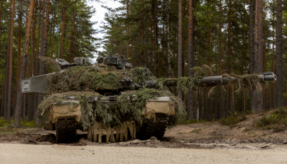
Defence Secretary Sir Michael Fallon has delivered a speech at Cyber 2017 outlining how the Ministry of Defence is tackling today’s cyber threats.
Here we take a look at the highlights of the speech.
Discussing the latest cyber attack on the UK, he said: “Investigations so far have found that the hackers were attempting to carry out a sustained and determined attack on all parliamentary user accounts in an attempt to identify weak passwords and to gain access to users’ emails.
“Immediate steps have been taken to address that particular problem.”
Sir Michael then praised the National Cyber Security Centre and its work to contain the attack and mitigate possible future breaches. He talked about how cyber attacks are a global threat with countries from the UK, to Germany and Bulgaria are being targeted.
“Bulgaria has also suffered, and I quote from them, according to their President, ‘the heaviest and most intense cyber attack…conducted in south-east Europe’ And of course, there have been attacks on America, with the United States Office of the Director of National Intelligence concluding that Russia had targeted the Presidential election.”
He went on the highlight the very real problems cyber attacks are having on countries.
“One in five British businesses has been hacked by cyber criminals in the last year according to the British Chambers of Commerce. Analysts put the cost to our economy already in the billions, while it’s been estimated that the United States lose up to three per cent of GDP to Intellectual Property theft.”
As well as civilian attacks, cyber disruption for the military was a prominent part of his speech, and how the UK is mitigating this.
“For the military, the consequences of cyber disruption are equally devastating. Reuters has reported that Russia used malware implants on Android devices to track and target Ukrainian artillery. That’s why back in the 2015 Strategic Defence and Security Review we put cyber up there with terror and major natural hazards as a Tier One threat to this country.
“We are investing a huge chunk of money – some £1.9bn – into boosting our cyber security, and Defence, in particular, has a three-fold role to play in this national cyber security effort.”
Sir Michael delved into the efforts being made by the UK MOD, from working closely with the National Cyber Security Centre, to ensuring that military and civilian systems are robust, and recruiting cyber savvy personnel.
“Cyber is becoming now a core part of our military training. In January, we will open a dedicated state-of-the-art Defence Cyber School at Shrivenham, bringing together all our military joint cyber training into one place. And we look forward to that first class of 2018 emerging with the digital X-factor to transform our future cyber capability.”
Stating the cyber blurs the boundaries between military and civilian security, Sir Michael wanted to remind attendees that everyone has a responsibility for cyber security, from using a stronger password, to installing security updates in a timely manner, which would help ward off attacks.
Finally, Sir Michael said, the government was committed to protecting national infrastructure through strengthening the UK’s deterrence through a rising budget.
“we’re using our rising budget to invest our £178Bn in full spectrum capability, from carriers to Ajax armoured vehicles, fifth generation F35 to the latest UAVs, signalling to potential cyber strikers that the price of an online attack could invite a response from any domain, air, land, sea or cyber space.”
“We’re determined as a coalition to maintain our advantage in this arena and that is why we are investing with our allies in the sort of kit capable of data use.”
The UK is determined to be leaders in cyber security, and to this end the MOD has invested in developing new technologies with the launch of a multimillion pound competition to develop machine learning algorithms and Artificial Intelligence. International partnerships are an important factor of this and the UK is working closely with NATO to improve cyber operations.
“At last year’s Warsaw summit we achieved a breakthrough in getting the Alliance to recognise cyber as a distinctive domain of operations.” He said. “We also succeeded in persuading NATO nations to sign the cyber pledge, committing Allies to enhance their national defences as a priority and to strengthen their capability, collectively and individually, to resist cyber attacks in any form. There remains work to be done to share our data to deal with major incidents together and to improve the underlying infrastructure of the Internet. At the same time, we will also need new doctrine to clarify our response within NATO to anonymous cyber activity which often takes place now in that grey zone below the previously understood threshold of war. And all the while we are developing the effects, covert and overt, cognitive and physical, to help provide a proportionate response to those cyber attacks.”
Sir Michael concluded: “So let me say in conclusion that cyber is a serious problem. It is a growing problem. But my message to you is that Government here and Defence, in particular, is on the case. Over the next few years we’re going to be redoubling our efforts to strengthen our resilience against our adversaries, to strengthen our hand against our cyber adversaries and to ensure those who mean to do our country harm, offline or online, have nowhere to hide.”
If you would like to join our community and read more articles like this then please click here
Bulgaria cyber security Defence Secretary Sir Michael Fallon MOD National Cyber Security Centre NATO Ukraine US








